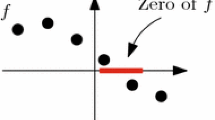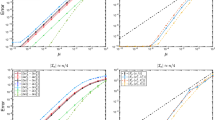Abstract
Various algorithms can compute approximate feasible points or approximate solutions to equality and bound constrained optimization problems. In exhaustive search algorithms for global optimizers and other contexts, it is of interest to construct bounds around such approximate feasible points, then to verify (computationally but rigorously) that an actual feasible point exists within these bounds. Hansen and others have proposed techniques for proving the existence of feasible points within given bounds, but practical implementations have not, to our knowledge, previously been described. Various alternatives are possible in such an implementation, and details must be carefully considered. Also, in addition to Hansen’s technique for handling the underdetermined case, it is important to handle the overdetermined case, when the approximate feasible point corresponds to a point with many active bound constraints. The basic ideas, along with experimental results from an actual implementation, are summarized here.
Similar content being viewed by others
References
R.B. Kearfott, A review of techniques in the verified solution of constrained global optimization problems, in: R.B. Kearfott, V. Kreinovich (Eds.), Applications of Interval Computations, Kluwer Academic Publishers, Dordrecht, The Netherlands, 1996, pp. 23–60.
E.R. Hansen, Global Optimization using Interval Analysis, Marcel Dekker, New York, 1992.
R.B. Kearfott, Rigorous Global Search: Continuous Problems, Kluwer Academic Publishers, Dordrecht, The Netherlands, 1996.
H. Ratschek, J. Rokne, New Computer Methods for Global Optimization, Wiley, New York, 1988.
M.A. Wolfe, An interval algorithm for constrained global optimization, Journal of Computational and Applied Mathematics 50 (1994) 605–612.
C. Jansson, O. Knüppel, A global minimization method: The multi-dimensional case, Technical Report 92.1, Informationstechnik, Technische Uni. Hamburg-Harburg, Hamburg, Germany, 1992.
O. Caprani, B. Godthaab, K. Madsen, Use of a real-valued local minimum in parallel interval global optimization, Interval Computations 3 (1993) 71–82.
R.B. Kearfott, On verifying feasibility in equality constrained optimization problems, Technical report, University of Southwestern, Louisiana, Lafayette, LA, 1994.
A. Neumaier, Interval Methods for Systems of Equations, Cambridge Univ. Press, Cambridge, UK, 1990.
G. Alefeld, J. Herzberger, Introduction to Interval Computations, Academic Press, New York, 1983.
R.E. Moore, Methods and Applications of Interval Analysis, SIAM, Philadelphia, PA, 1979.
R.B. Kearfott, Preconditioners for the interval Gauss-Seidel method, SIAM Journal on Numerical Analysis 27 (1977) 804–822.
G. Mayer, Epsilon-inflation in verification algorithms, Journal of Computational and Applied Mathematics 60 (1994) 147–169.
S.M. Rump Kleine Fehlerschranken bei Matrixproblemen, Ph.D. Thesis., Universität Karlsruhe, Karlsruhe, Germany, 1980.
S.M. Rump, Verification methods for dense and sparse systems of equations, in: J. Herzberger (Ed.), Topics in Validated Computations, Elsevier, Amsterdam, The Netherlands, 1994, pp. 63–135.
C.A. Floudas, P.M. Pardalos, A Collection of Test Problems for Constrained Global Optimization Algorithms, Springer, New York, 1990.
R.B. Kearfott, A Fortran 90 environment for research and prototyping of enclosure algorithms for nonlinear equations and global optimization. ACM Transactions on Mathematical Software 21 (1995) 63–78.
A.R. Conn, N. Gould, Ph.L. Toint, LANCELOT: A Fortran Package for Large-Scale Nonlinear Optimization, Springer, New York, 1992.
B.P. Kristinsdottir, Z.B. Zabinsky, T. Csendes, M.E. Tuttle, Methodologies for tolerance intervals, Interval Computations 3 (1993) 133–147.
Author information
Authors and Affiliations
Additional information
This work was supported in part by National Science Foundation grant CCR-9203730.
Rights and permissions
About this article
Cite this article
Kearfott, R.B. On proving existence of feasible points in equality constrained optimization problems. Mathematical Programming 83, 89–100 (1998). https://doi.org/10.1007/BF02680551
Received:
Issue Date:
DOI: https://doi.org/10.1007/BF02680551




